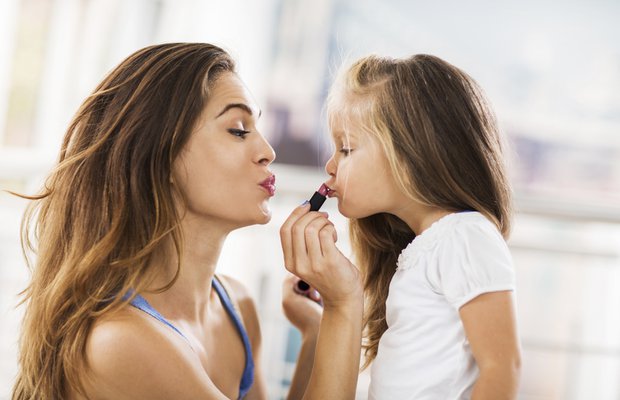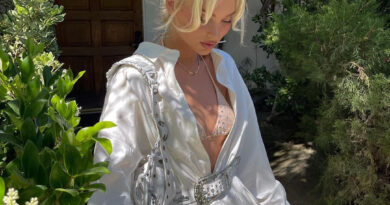Makeup is dangerous for girls!
Emulating the mother of little girls make-up wanting to play with his equipment is a situation that is seen more than once, but the approaches and boundaries related to this issue are very valuable. In recent years, this desire has begun to lose some of its innocence. There are now make-up materials for little girls on the market. As Pudra.com, we focused on the dangers of these cosmetic products. children’s head gender We wanted to draw attention to this issue so that the perception of people would be correct and that they would not experience problems both at this age and in their later years. So what should parents do? What are the harms of cosmetics produced for children? Psychiatrist Deniz Arık Binbay discussed the issue in detail for Pudra.com.

Where does the curiosity of young girls to show themselves older and feminine come from?
Young children become aware of their own gender around the age of 3 years. Afterwards, they compete with their same-sex parents and identify with their same-sex parents at the end of a 1.5-2 year period. This period culminates in adopting gender roles. Not your gender (i.e. male or female), but how womanand how male It is actually a process of learning how to be. This learning process depends on the personalities of the parents, whether they are at peace with their own gender identity, and how they position themselves in society and in the bond.
Another factor that interacts with all of this is the social view of gender roles. In other words, how a woman or a man is defined socially, which features are considered appropriate and which are inappropriate. These social acceptances and judgments vary from society to society and according to the time lived in it. For example, while in some countries in Western Europe it is considered normal for women to go to the pool or the sea without waxing, in our society it is considered strange for women to walk “hairy” on the street or by the sea, even in their own residences, and it is even considered disgusting by some.

mid 3-5,5 years oedipal period In the period of rivalry with their same-sex parents, which is defined as the stigma, little girls have an interest in showing themselves older and feminine, and this is natural. A girl of this age always wears dresses and skirts, to high heels There are long periods when she is curious and wants to use her mother’s make-up tools. We can explain this situation with the desire to emulate her mother, to be about her, or even to surpass her mother.
But the real risk cluster in this bet is adolescents. to depressionscan cause.
What are the harms caused by the use of cosmetics in children?
Let’s list the physical losses as follows: Allergy, eczemaIn addition to diseases related to the skin, some chemicals absorbed from the skin hormone It can lead to early puberty by disrupting its regulation. Excessive use may have adverse effects on the liver. Especially BPAsome aspects used in cosmetics, including carcinogenic may have effects. It is known that the mixing of lead, which is found in cosmetic products, especially lipsticks, into the blood has great losses on human health. Bullet It negatively affects border systems, blood cells, and vitamin D and calcium metabolism. It reacts with the hemoglobin in the blood, such as learning difficulties, distraction, and behavioral disorders.
What are the psychological harms of using cosmetics in children?
Sexualization (sexualizing the child) and objectification (because make-up is made to look nice for a glutton to look at). Early sexualization may pose risks to the child within and outside the child orientation. Children who look more feminine to sexual harassmentthe risk of injury may increase.
Are cosmetic products that say “natural” or “organic” healthier?
The words “natural”, “organic” or “hypoallergenic” on it does not mean that the works are harmless. According to the FDA (Food and Drug Administration), these words have no specific meaning other than the obvious market cost that affects consumer purchases (FDA 2000b). Artifacts labeled “organic” or “natural” may contain petrochemicals and organic certified productsIt may have organic content of 10% by weight or volume (Certech 2008).
EWG (Environmental Working Group) is one of the addresses where you can question the reliability of the products you apply to yourself and your child’s skin. This non-profit organization’s Skin Deep database contains information about cosmetic products.
How should families approach their children about the use of cosmetics?
Children look at what parents do rather than what they say. Therefore, the most valuable point in the approach is the parents’ own attitudes. The connection of family members, especially the mother, with her own body is internalized by the child. Parents should share their intentions with their children for reasons. For example, why make-up is not suitable for children, through the efforts of the hero to beautify himself while watching a cartoon or with the help of a book, naturalness and beauty themes can be discussed. It can be said that these works are not healthy and faithful for children, but it would be more truthful not to go into too much detail and not to scare the child too much. During these conversations, it is possible to learn what the child knows, what he thinks and what he is curious about, by first allowing him to express himself. Talking over a cartoon or fairy tale hero, not directly over the child himself, makes the child feel more comfortable. The best time is when the child asks a question about the subject.
Forbidding or blocking a random thing altogether arouses more curiosity in the child, and whatever is prohibited is valued in the eyes of the child. For this reason, exceptions should be defined after the general intentions and reasons are shared with the child. For example, a short-term use of a partially harmless work suitable for a child may be permitted on a special occasion. Embarrassing, disparaging comments or punitive approaches are not necessarily appropriate for the child’s requests to be admired or put on make-up. It is very valuable for the child to feel loved for who he is. In this period, his wishes must be seen, cared for, spoken, and tried to be allowed within the end. However, making sure that the child feels accepted as he or she is will pave the way for him to love himself as he is and become a self-confident adult.
For older children and adolescents, we should teach them to use it faithfully, that is, not to share make-up tools, to remove make-up completely before going to bed at night, and to stop using it quickly if allergies and irritation develop. The first thing he will use is to try on his arm first, rednessIt is also useful to say that if there is no swelling or burning sensation, you can apply it to your face after a while.




